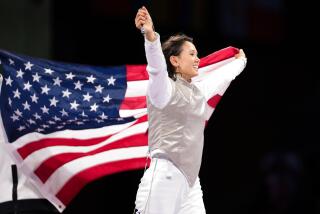U.S. OLYMPIC FESTIVAL : She Took Stab at This Sport and Liked It : Fencing: Felicia Zimmermann has become the top female competitor in the nation.
- Share via
SAN ANTONIO — Felicia Zimmermann laughs when she remembers the day her father, Thomas, told her that he was enrolling her in fencing classes.
Zimmermann, a shy 8-year old, looked up from her piano practice. She was not interested in fencing, she told him.
“Do you even know anything about fencing?” she asked.
He shrugged. Not really.
But he had seen an advertisement in the local newspaper for a fencing center in nearby Rochester, N.Y. He thought the sport might make his quiet daughter more assertive.
It didn’t work. Nine years later, Zimmermann is still pretty timid.
She has, however, developed into the nation’s top female fencer.
Zimmermann will compete in the women’s foil competition today and Sunday at the U.S. Olympic Festival. It is Zimmermann’s third festival appearance. She finished sixth in the individual women’s foil in 1990 and 1991.
Zimmermann, 17, is poised to lead the U.S. women into the 1996 Olympics at Atlanta.
She won the national championship in women’s foil last month at Ft. Myers, Fla.
It didn’t figure that Zimmermann would become an elite athlete. Tall and scrawny as a child, she has never been exceptionally coordinated or strong.
But when she steps on the fencing strip, she becomes a tenacious competitor. She emits a scream during an attack--or riposte--that would put Monica Seles to shame.
“Maybe, because she wasn’t like that in regular life, (fencing) gave her an outlet,” said Buckie Leach, Zimmermann’s coach at the Rochester Fencing Center.
Zimmermann’s explanation is simple.
“I love winning,” she said.
When Zimmermann was younger, she idolized Nadia Comaneci. She watched a movie of Comaneci’s life over and over again, admiring Comaneci’s habit of practicing a single trick hundreds of times.
Zimmermann, too, is a perfectionist.
When she was struggling recently, in a relatively insignificant competition at Stanford, Leach approached her to tell her to relax and enjoy herself.
“She gave me the nastiest look I’ve ever gotten from anybody,” Leach said. “She had no intention of relaxing.”
Zimmermann graduated fourth in a class of 70 from Rochester’s School of the Arts High, a magnet school where she was a visual arts major. She also is an accomplished classical pianist. Johannes Brahms, she said with a smile, wrote his “Rhapsody No. 2” especially for her.
But Zimmermann has little time for piano now. In the last 10 months, she has gone to Europe for fencing seven times.
Most of the big fencing meets are held in Europe, so it is not surprising that many Americans have little understanding the sport.
Even fencers have difficulty explaining their sport. Nick Bravin, the bronze medalist in men’s foil at the 1991 Pan American Games, offered this unlikely comparison: “It’s like tennis.”
The sports are similar mainly because the equipment--tennis racket or sword--is held with one hand. They are different, of course, because tennis players do not go jabbing one another in the chest.
Actually, it is considered poor fencing technique to hit an opponent too hard. Although top fencers often are very similar on a technical level, style separates the elite from the mediocre.
Peter Westbrook, a five-time Olympian who won an Olympic bronze medal in 1984, said that Zimmermann has a natural flair for the dramatic in her fencing.
“You can really tell when you see people who have something special,” Westbrook said. “Even people who know nothing about fencing, they will see that.”
Perhaps one reason fencing has a limited following is that it seems archaic and formal. But Zimmermann said that fencing is misunderstood.
“I’ve never thought of fencing as a classical sport,” she said. “I think of it as very modern, very up-and-coming.”
With that, Zimmermann laced up a pair of high-top fencing shoes and grabbed her foil.
More to Read
Go beyond the scoreboard
Get the latest on L.A.'s teams in the daily Sports Report newsletter.
You may occasionally receive promotional content from the Los Angeles Times.






